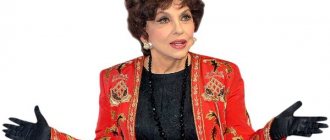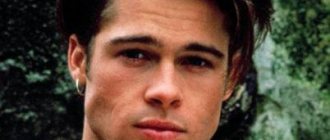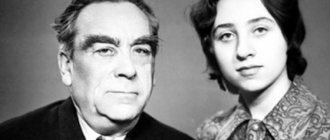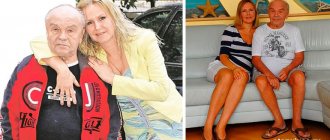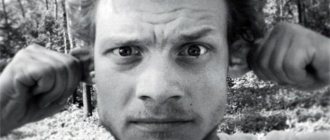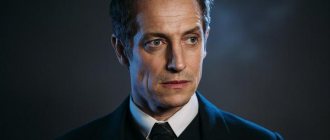Wikipedia has articles about other people with the surname Rowlands.
| Gena Rowlands | |
| Gena Rowlands | |
Studio photography from the 1960s | |
| Citizenship: | USA USA |
| Profession: | actress |
| Career: | 1954 - present time |
Virginia Catherine (Gina) Rowlands
(English:
Virginia Cathryn "Gena" Rowlands
, born June 19, 1930 (19300619), Madison, Wisconsin) - American actress, member of the Cassavetes acting dynasty.
Biography
Rowlands attended college and then the University of Wisconsin and received acting training at the Academy of Dramatic Arts in New York. Her stage debut took place at New York's Provincetown Playhouse, where she began working as a cloakroom attendant. Until the end of the 1950s. Gina played exclusively in the theater, in particular on Broadway. Her film debut was a role under contract with Metro-Goldwyn-Mayer in Jose Ferrer's 1958 film The High Price of Love.
Rowlands was married to actor and director John Cassavetes, who cast her in many of his films, such as 1980's Gloria. Their common son, Nick Cassavetes, directed Gena Rowlands in many films, in particular, in the film “Plucking the Stars,” based on his father’s script.
Rowlands has four children. Alexandra Cassavetes also became an actress, and Zoe Cassavetes became a director.
About him
John Cassavetes was born on December 9, 1929 in New York in a family of immigrants from Greece. Growing up on Long Island, he was not particularly persistent in his studies, but always attracted attention with his expressive character. After graduating from high school, John entered college, but was successfully expelled after the first semester due to poor grades. After that, he went to the American Academy of Arts, from which he graduated in 1950. She gave him more than one could expect: an excellent education, prospects and a beautiful wife (Gena Rowlands).
John Cassavetes is considered one of the most important representatives of independent American cinema. His films and ideas were further developed in the projects of Martin Scorsese, J. L. Godard, Jacques Rivette, Nanni Moretti. He was nominated several times for Oscars as a writer, director and actor. John Cassavetes died in 1989 from cirrhosis of the liver.
Filmography
- One Part of a Billion (2014) - Esther
- Love with a Dictionary (2007) - Vivien Wilder-Mann
- Paris, I love you (2006) - Gina
- The Key to All Doors (2005) - Violet Deveraux
- The Notebook (2004) - Ellie Calhoun
- Taking Lives (2004) - Mrs. Usher
- Hysterical Blindness (2002) - Virginia Miller
(TV) - The Untamed Iris (2001) - Minnie Brinn
(TV) - The Color of Love: The Jaycee Story (2000) - Georgia Porter
(TV) - Weekend (1999) - Laura Ponti
- Vicissitudes of Love (1998) - Hannah
- Grace and Gloria (1998) - Grace
(TV) - Giant (1998) - Grandmother
- A Glimmer of Hope (1998) - Ramona Calvert
- Paulie (1998) - Evie
- Best Friends (1998) - Mrs. Harriett Cahill
(TV) - She's Beautiful (1997) - Miss Jane Green
- Plucking the Stars (1996) - Mildred Hawks
- The Neon Bible (1995) - Mae Morgan
- Talking Point (1995) - Georgia King
- Parallel Lives (1994) - Francie Pomerantz
(TV) - Crazy in Love (1998) - Honor Swift
(TV) - The Face of a Stranger (1991) - Pat Foster
(TV) - Night on Earth (1991) - Victoria Snelling
- Another Circle (1991) - Marilyn Bella
- The Other Woman (1988) - Marion Post
- Daylight (1987) - Ginette Rasnick
- Early Frost (1985) - Kate Pearson
- Streams of Love (1984) - Sarah Lauson
- The Tempest (1982) - Antonia Dimitrius
- Gloria (1980) - Gloria Swanson
- Heist (1978) - Mary Pino
- A Question of Love (1978) - Linda Rae Guettner
(TV) - Premiere (1977) - Myrtel Gordon
- Two Minute Warning (1976) - Janet
- Columbo Rewatch (1975) - Elizabeth Van Wyk
(TV) - A Woman Under the Influence (1974) - Mabel Longetti
- Minnie and Moskowitz (1971) - Minnie Moore
- The Untouchables (1968) - Rosemary Scott
- Faces (1968) - Jeannie Rapp
- A Child is Waiting (1963) - Sophie Widdicombe/Banham
- Lonely Are the Brave (1962) - Jerry Bondy
- Shadows (1959) - Woman in a Nightclub
(uncredited)
Online magazine Cineticle
Actress, icon, collaborator with her husband John Cassavetes and mother of his children, Gena Rowlands has been a guiding light in independent cinema for nearly 50 years. On Cassavetes's birthday, we are publishing an interview with the three-time Emmy winner, two-time Golden Globe winner and honorary Oscar winner to remember her best roles together with Rowlands.
– I know they tell you this all the time, but still: I recently watched your and John’s films and was amazed at how modern they were. This is noticeable in everything: in the way John worked with the actors, in his direction, in the camera decisions, in this special mobility of the camera and the fluidity of its movements, in the way John builds a shot and focuses, highlighting the faces of the characters. You've been with John since the beginning of his directing career. Did you understand then what you were doing and what you were risking in this case? Was this a natural decision for you?
- Oh yeah! Only after gaining complete independence could we do what truly interests us. This decision was easy for us; John and I were on the same page. We immediately agreed with him: he would direct films, I would act in them, and all our actor friends would join me. We wanted to show people who have something to say; I mean those people who really live, and not just exist.
– You didn’t have to play in “Shadows,” but maybe you showed yourself in some other way during the filming process?
– No, I had nothing to do with “Shadows,” which is understandable: at that time I was busy in the theater, Edward G. Robinson and I played in “Middle of the Night.” Shadows was originally a separate project by John and his friends. They rehearsed for a long time, improvised and, in the end, decided to make a film based on these improvisations. So I didn’t deserve a mention in the credits (laughs). Nevertheless, I really liked the picture, especially the acting, which seemed spontaneous - and indeed it was. But this was the last time John filmed, strictly speaking, without a script.
– What I especially like about “Faces” are the images of the characters, which are far from the stereotypes accepted at that time. In this film you play a prostitute, but your character is by no means the banal “whore with a heart of gold” type. Your heroine cannot be called negative - she is, first of all, a complex human being with her own shortcomings and her own attractive features. And just like your image, everything else about Faces was just as innovative and vibrant. Did you realize at the time that you were part of a new, independent film movement?
“We didn’t think about it too much.” We simply did what we thought was necessary - for example, when we discussed how this or that character should behave. Most of it was John's doing, he came up with them, he brought them to life. And only then he allowed us to change and develop these images according to our understanding. Despite the fact that the characters' characters were written out in the script in detail and with the utmost care, we always had the opportunity to improvise. If you wanted to try something new, John was willing to accommodate.
– I was always amazed by your performance in “A Woman Under the Influence”: your facial expressions, the way you move...
– This role is dearer to me than others. As for my facial expressions, they were just a continuation of what had already been written by John. Even when I read the script, my heroine seemed so alive to me! And how good Peter is there (Falk - editor's note). My heroine’s husband doesn’t know anything about psychiatry, but he tries to understand his wife and patiently endures all her mental turmoil and her strange behavior, which from the outside may seem rather inadequate. He may not succeed in everything, but he knows that he loves her, and this knowledge is enough for him, and this... this is a miracle! In this he was very similar to Peter himself, but whatever - this character was Peter.
– I think that very scene where you two are lying on the sofa became a certain test for you.
– It was something. According to the script, Peter was supposed to punch me, and it wasn’t easy for him. But he understood that his character was not one of those who let go of trifles, as soon as they itched, and that this blow was only a consequence of the monstrous stress that the heroine’s husband experienced throughout the film. And Peter hit her just right.
– Another great scene where you try to get the exact time from several women while you're waiting for the school bus—every time I watch it, I want to exclaim, “People, what's your problem? Can’t you tell her what time it is?!”
– (laughs) Two of them and I once went to the same school! We have been friends for a long time, I invited them to “take a walk” in front of the camera, and they asked: “What will we need to do?” They seriously thought they would have to play! I replied: “You don’t need to do anything, there are things to do for a minute. I will speak, you will remain silent, that’s all for a short time.” I think it turned out well, we had a lot of fun.
– "Premiere" is a whole large-scale study of a phenomenon that actresses face both in real life and on the set - their own aging. What seems especially important to me is that the episodes in the everyday life of the characters are sometimes impossible to distinguish from the events taking place in the play they are rehearsing. There is a wonderful phrase in the film: “Reality seems unreal to me.”
– The topic of aging concerned me directly, I think, like all actresses and actors, including Joan Blondell. Nobody is getting younger, but it is much more difficult for actors to get used to this, since they have to always be in the public eye. There is a scene in the film where a girl, played by Laura Johnson, is hit by a car. I was completely captivated by this scene. I tried to imagine what was going on in the soul of my heroine at that moment, and could not understand how she found the strength to go on stage after what happened. This downed girl... She was so young - just like me at her age. In some way, she and I were one.
– Joan Blondell is a veteran of Hollywood studio films. Perhaps the atmosphere on the set of an independent film was new to her?
“Once, after one of the takes, we were chatting about something with her, and suddenly she said: “Wait. Wait. Who am I talking to now - Gina or Myrtle (the name of Rowlands' character in Premiere - editor's note)? And I answered: “I don’t know myself!” (laughs). Joan was an old school actress, one of my favorite actresses, but she quickly worked with John. Besides, he and I simply adored the stars from old films.
– I love the scene in Minnie and Moskowitz where you and Florence are talking about old movies that feed the public fairy tales, and how in real life you will never meet a man like Humphrey Bogart and Charles Boyer. Every time I watch this scene, I can't help but feel like you're not acting, but actually talking to each other. No one could shoot like that.
- That's right, no one. But John succeeded. When I read the script for the first time, I was amazed. I have never seen a young girl and an old lady discussing their sex life in a movie. I also really like in this scene when Florence says: “These films are a complete sham” (laughs). A setup, that's for sure.
– Seymour Cassel is far from Charles Boyer, and yet he is an incorrigible romantic...
– Seymour is a wonderful actor. And he is also very brave. Remember when he jumps off the roof in Faces? He actually jumped. John did twenty takes of this scene, no less. And Seymour kept jumping and jumping - as soon as he didn’t break his neck.
– John wanted you and Montgomery Clift to star in Too Late Blues...
– True, but nothing worked out for us - the theater absorbed all my time. By the way, in “Gloria” it happened the other way around: another actress was supposed to play my role, but for some reason she couldn’t. But by that time I had already fallen in love with this role of a tough woman, inside of whom the maternal instinct slowly, creakingly, reveals itself. And then finally it goes off, and that’s it - I start spanking these bad boys one by one - bang, bang, bang! This is what motherly love means.
– Are you still in the ranks - and, it seems, you do not intend to give up cinema?
“I think now is the time for me to retire.” Older actresses are no longer given interesting, juicy roles. It's rare to see something like this.
– What is the most useful advice you have received in your life?
“On the set of “Women Under the Influence,” I suddenly realized that I didn’t have the slightest idea how to act in that scene where my heroine falls into hysterics. I told John, “I don’t want to upset you, but I seriously don’t know what is required of me. Tell me directly what you want." He answered me: “Gina, you read the script, right? You liked him, right? You liked your role, didn't you? You really dreamed of playing her, didn’t you? Well, go and play” (laughs).
Original: Gina Rowlands. Kim Morgan talks with the acting icon
Translation: Dmitry Bunygin
December 9, 2016
Tags:
- John Cassavetes
Awards and nominations
| Reward | Year | Category | Film/TV series | Result |
| Oscar | 1975 | Best Actress | Woman under the influence | Nomination |
| 1981 | Best Actress | Gloria | Nomination | |
| Golden Globe | 1975 | Best Actress in a Drama | Woman under the influence | Victory |
| 1978 | Best Actress in a Drama | Premiere | Nomination | |
| 1981 | Best Actress in a Drama | Gloria | Nomination | |
| 1984 | Best Actress in a Miniseries or TV Movie | Thursday's Child | Nomination | |
| 1986 | Best Actress in a Miniseries or TV Movie | Early frost | Nomination | |
| 1988 | Best Actress in a Miniseries or TV Movie | The Betty Ford Story | Victory | |
| 1993 | Best Supporting Actress in a Miniseries, Television Series or TV Movie | Crazy in love | Nomination | |
| 2003 | Best Supporting Actress in a Miniseries, Television Series or TV Movie | Hysterical blindness | Nomination | |
| Emmy | 1986 | Best Actress in a Miniseries or Movie | Early frost | Nomination |
| 1987 | Best Actress in a Miniseries or Movie | The Betty Ford Story | Victory | |
| 1992 | Best Actress in a Miniseries or Movie | The face of a stranger | Victory | |
| 2000 | Best Actress in a Miniseries or Movie | The Color of Love: Jaycee's Story | Nomination | |
| 2002 | Best Actress in a Miniseries or Movie | Indomitable Iris | Nomination | |
| 2003 | Best Supporting Actress in a Miniseries or Movie | Hysterical blindness | Victory | |
| 2007 | Best Actress in a Miniseries or Movie | What if God was the sun? | Nomination | |
| 2009 | Best Guest Actress in a Comedy Series | Defective Detective | Nomination | |
| Daytime Emmy Awards | 2004 | Best Performance in a Children's, Youth or Family Series | The Incredible Mrs Ritchie | Victory |
| Screen Actors Guild Award | 1997 | Best Actress | Tearing down the stars | Nomination |
| 2008 | Best Actress in a TV Movie or Miniseries | What if God was the sun? | Nomination |
Angelina Jolie - Mila Kunis (Gia)
Here the actresses are selected with one hundred percent similarity! If not for this film, no one would have noticed the similarities between these girls! Angelina Jolie and Mila Kunis together created the image of the famous fashion model Gia, who became famous after her death from AIDS. Mila reincarnated as 11-year-old Gia, and she managed to get into character! And Jolie received a Golden Globe Award for her role as a model.
Links
- Wikimedia Commons has media related to Gena Rowlands
- Gena Rowlands on the Internet Movie Database
1980-1990s Renate Krösner (1980) Barbara Grabowska (1981) Catherine Sass (1982) Evgenia Glushenko (1983) Inna Churikova (1984) Joe Kennedy (1985) Charlotte Valandry / Marcelia Cartacho (1986) Ana Beatriz Nogueira (1987) ) · Holly Hunter (1988) · Isabelle Adjani (1989) · Victoria Abril (1991) · Maggie Cheung (1992) · Michelle Pfeiffer (1993) · Chrissy Rock (1994) · Josephine Xiao (1995) · Anouk Greenberg (1996) · Juliette Binoche (1997) Fernanda Montenegro (1998) Maria Schrader / Juliane Köhler (1999) 2000s Bibiana Beglau / Nadia Uhl (2000) Kerry Fox (2001) Halle Berry (2002) Nicole Kidman / Meryl Streep / Julianne Moore (2003) Charlize Theron / Catalina Sandino Moreno (2004) Julia Jentsch (2005) Sandra Hüller (2006) Nina Hoss (2007) Sally Hawkins (2008) Birgit Minichmayr (2009) Shinobu Terajima (2010) Sarina Farghadi / Sare Bayat / Leila Hatami (2011) Rachelle Mwanza (2012) Pauline Garcia ( 2013) Haru Kuroki (2014) Charlotte Rampling (2015)
Excerpt characterizing Rowlands, Gina
Two years ago, in 1808, having returned to St. Petersburg from his trip to the estates, Pierre unwittingly became the head of St. Petersburg Freemasonry. He set up dining rooms and funeral lodges, recruited new members, took care of the unification of various lodges and the acquisition of authentic acts. He gave his money for the construction of temples and replenished, as much as he could, alms collections, for which most members were stingy and careless. He almost alone, at his own expense, supported the home of the poor, established by the order in St. Petersburg. Meanwhile, his life went on as before, with the same hobbies and debauchery. He loved to dine and drink well, and although he considered it immoral and degrading, he could not refrain from enjoying the bachelor societies in which he participated. In the midst of his studies and hobbies, Pierre, however, after a year, began to feel how the soil of Freemasonry on which he stood was moving away from under his feet, the more firmly he tried to stand on it. At the same time, he felt that the deeper the soil on which he stood went under his feet, the more involuntarily he was connected with it. When he began Freemasonry, he experienced the feeling of a man trustingly placing his foot on the flat surface of a swamp. Putting his foot down, he fell through. In order to be completely sure of the solidity of the soil on which he stood, he planted his other foot and sank even further, got stuck and involuntarily walked knee-deep in the swamp. Joseph Alekseevich was not in St. Petersburg. (He had recently withdrawn from the affairs of the St. Petersburg lodges and lived in Moscow without a break.) All the brothers, members of the lodges, were people familiar to Pierre in life, and it was difficult for him to see in them only brothers in masonry, and not Prince B., not Ivan Vasilyevich D., whom he knew in life for the most part as weak and insignificant people. From under the Masonic aprons and signs, he saw on them the uniforms and crosses that they sought in life. Often, while collecting alms and counting 20–30 rubles recorded for the parish, and mostly in debt from ten members, half of whom were as rich as he was, Pierre recalled the Masonic oath that each brother promises to give all his property for one's neighbor; and doubts arose in his soul, which he tried not to dwell on. He divided all the brothers he knew into four categories. In the first category he ranked brothers who do not take an active part either in the affairs of lodges or in human affairs, but are occupied exclusively with the mysteries of the science of the order, occupied with questions about the triple name of God, or about the three principles of things, sulfur, mercury and salt, or about the meaning of square and all the figures of Solomon's temple. Pierre respected this category of Freemason brothers, to which mostly old brothers belonged, and Joseph Alekseevich himself, in Pierre's opinion, but did not share their interests. His heart was not in the mystical side of Freemasonry. In the second category, Pierre included himself and his brothers like him, those who are searching, hesitating, who have not yet found a direct and understandable path in Freemasonry, but hoping to find it. In the third category he included brothers (there were the largest number of them) who did not see anything in Freemasonry except the external form and ritual and valued the strict execution of this external form, without caring about its content and meaning. Such were Vilarsky and even the great master of the main lodge. Finally, the fourth category also included a large number of brothers, especially those who had recently joined the brotherhood. These were people, according to Pierre’s observations, who did not believe in anything, did not want anything, and who entered Freemasonry only to get closer to young brothers, rich and strong in connections and nobility, of whom there were quite a lot in the lodge. Pierre began to feel dissatisfied with his activities. Freemasonry, at least the Freemasonry that he knew here, sometimes seemed to him to be based on appearance alone. He did not even think of doubting Freemasonry itself, but he suspected that Russian Freemasonry had taken the wrong path and deviated from its source. And therefore, at the end of the year, Pierre went abroad to initiate himself into the highest secrets of the order. In the summer of 1809, Pierre returned to St. Petersburg. From the correspondence of our Freemasons with those abroad, it was known that Bezukhy managed to gain the trust of many high-ranking officials abroad, penetrated many secrets, was elevated to the highest degree and was carrying with him a lot for the common good of the masonry business in Russia. The St. Petersburg Masons all came to him, fawning on him, and it seemed to everyone that he was hiding something and preparing something. A solemn meeting of the 2nd degree lodge was scheduled, in which Pierre promised to convey what he had to convey to the St. Petersburg brothers from the highest leaders of the order. The meeting was full. After the usual rituals, Pierre stood up and began his speech. “Dear brothers,” he began, blushing and stammering, and holding the written speech in his hand. - It is not enough to observe our sacraments in the silence of the lodge - we need to act... act. We are in a state of sleep, and we need to act. – Pierre took his notebook and began to read. “To spread pure truth and bring about the triumph of virtue,” he read, we must cleanse people from prejudices, spread rules in accordance with the spirit of the times, take upon ourselves the education of youth, unite in unbreakable bonds with the smartest people, boldly and together prudently overcome superstition, unbelief and It is stupidity to form people loyal to us, bound together by a unity of purpose and having power and strength. “To achieve this goal, one must give virtue an advantage over vice, one must try to ensure that an honest person receives an eternal reward for his virtues in this world. But in these great intentions there are many obstacles that hinder us - the current political institutions. What to do in this state of affairs? Should we favor revolutions, overthrow everything, drive out force by force?... No, we are very far from that. Any violent reform is reprehensible, because it will not correct the evil in the least as long as people remain as they are, and because wisdom has no need for violence. “The entire plan of the order must be based on the formation of strong, virtuous people and bound by the unity of conviction, a conviction consisting in everywhere and with all their might to persecute vice and stupidity and to patronize talents and virtue: to extract worthy people from the dust, joining them to our brotherhood. Then only our order will have the power to insensitively tie the hands of the patrons of disorder and control them so that they do not notice it. In a word, it is necessary to establish a universal ruling form of government, which would extend over the whole world, without destroying civil bonds, and under which all other governments could continue in their usual order and do everything except that which interferes with the great goal of our order, then is the achievement of virtue's triumph over vice. Christianity itself presupposed this goal. It taught people to be wise and kind, and for their own benefit to follow the example and instructions of the best and wisest people. “Then, when everything was immersed in darkness, preaching alone was, of course, enough: the news of the truth gave it special power, but now we need much stronger means. Now it is necessary for a person, controlled by his feelings, to find sensual delights in virtue. Passions cannot be eradicated; we must only try to direct them to a noble goal, and therefore it is necessary that everyone can satisfy their passions within the limits of virtue, and that our order provides the means for this. “As soon as we have a certain number of worthy people in each state, each of them will again form two others, and they will all be closely united with each other - then everything will be possible for the order, which has already managed to secretly do a lot for the good of mankind.”
Childhood and youth
Information about the biography of the mother of the children of perhaps the most famous performer is extremely scarce. Deborah Jeanne Rowe was born in December 1958 in Spokane, Washington. Shortly before her 2nd birthday, her parents divorced. The girl was raised by her mother Barbara, aunts and grandmother. Gordon's father subsequently remarried; in 1961, Debbie gave birth to a half-sister, Loretta Scarlett.
Debbie Rowe in her youth
The woman's Jewish nationality was reported by JTA in the early 2000s when it distributed Rowe's official statement, in which she
“expressed concern that Michael Jackson’s relatives were instilling Islamic traditions in their children.”

